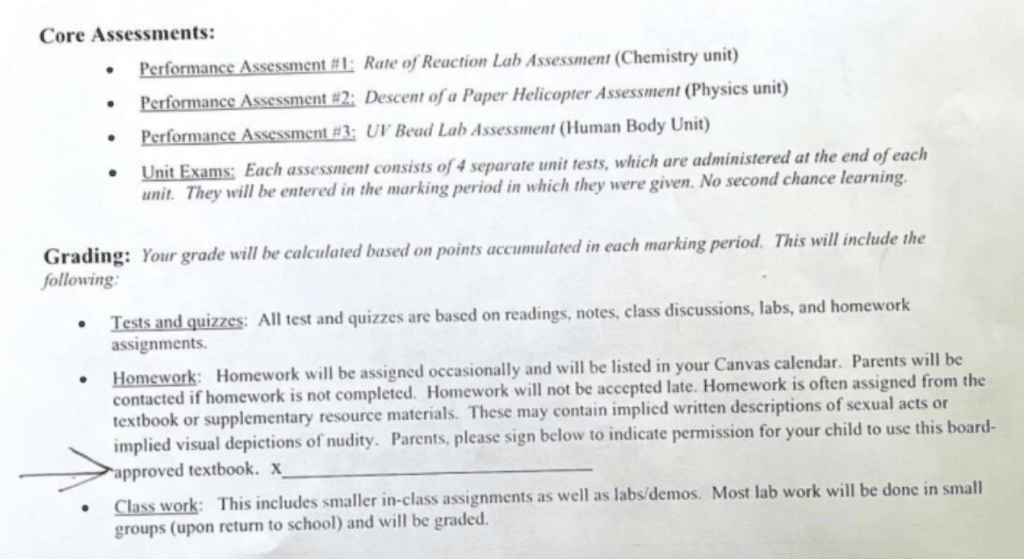The current board of school directors led by its new Democratic school board majority has decided to continue the conversation about the contentious and recently revised Policy 109 before any final decisions are made.
The changes made by the previous Republican board majority that made it easier for parents to successfully challenge library books was a point of sometimes heated debate within the community between those who saw it as paving an “expressway to unconstitutional censorship”, and the opposing camp who believed they were protecting their children from sexualization and “grooming.”
“We want this to be a discussion based building of these policies, we want to hear from people … we are definitely not rushing things,” said School Board President Karen Smith at last week’s policy committee meeting.
During that meeting they discussed reconsideration requests and parent options for restricting books for their own children. School board director Heather Reynolds supported the idea that “parents who have an issue with a certain subject matter should be able to say that they don’t want their child to have access to that book for their child.”
Reynolds also asked about the cost of book challenges, and suggested looking at how neighboring districts are approaching these policies. Interim Superintendent Malone confirmed there is indeed a cost associated with gathering the committee, including an hourly rate.
How We Got Here
In a pivotal moment during the Spring of 2022, the Central Bucks School District found itself thrust into the midst of a heated debate over the reintroduction, rewriting, and implementation of the 109 series of policies. This is a series of policies that broadly deals with resources, text books, and library materials. They include policies 109, 109.1, and 109.2.
Unlike neighboring school districts, Central Bucks took a distinctive approach by adding sub-policies specifically addressing classroom resources and library materials separately. The result of these policies was what some characterized as protecting children from “hypersexualized” content and others characterized as a book ban. The term “book ban” became a contentious point, as supporters of the policy argued against its usage – still others believe that any action taken against a book based on its content is in line with a ban.
READ: Central Bucks School District’s Draft Library Policy Overhaul Opens The Door To Censorship
The American Library Association [ALA] explains that a challenge arises when an individual or a group endeavors to eliminate or limit certain materials due to their objections. Banning, on the other hand, entails the actual removal of said materials. Challenges go beyond mere expression of opinions; they represent an effort to eliminate materials from educational curricula or library collections, consequently limiting access for others. Under the suspended policy, two books, Gender Queer and The Book is Gay, have been removed. It is unclear at this time if they can or will be reintroduced to the Central Bucks school libraries. There are more than 60 titles that remain challenged in the district and their fate is also unclear at this time.
One of the more contentious accusations that circulated involved labeling individuals who defended certain books as “groomers.” The underlying assumption was that those advocating for these titles might be doing so with the intention of desensitizing children to inappropriate content, potentially making them more susceptible to abuse. This belief was perceived by many parents and teachers as harmful hyperbole, causing significant concern and disagreement within the community.
Unpacking the Policies
Policy 109, the overarching policy, deals with “resource materials,” broadly encompassing supplemental instructional materials. Policies 109.1 and 109.2 provide more granular details on materials supplemental to textbooks and library resource materials, respectively. Notably, Central Bucks deviated from other districts by adding sub-policies rather than leaving the administration to handle implementation.
Former school director Sharon Collopy justified the initial retirement of Policy 109 in 2019, stating it was unnecessary as it essentially consisted of administrative regulations. However, Collopy supported the controversial reintroduction, particularly the library policy, that involved the Independence Law Center, the legal arm of the right-wing, anti-LGBTQ Christian Pennsylvania Family Institute, in crafting both the policy and administrative regulations.
To be clear, the school board is responsible for setting policy. A policy is a big picture statement of how the Board wants the district to operate. Policies should be reflective of the stated mission and vision of the district. But, the day to day management is not the purview of the board. It is up to the administration to determine the procedural elements for implementing policy at the school level. This point is particularly salient because the school board should not be involved in writing or approving administrative regulations. This is the work of the administrators in the district who both understand the policies and the ways in which each individual school operates.
The Textbook Issue
Policy 109.1, relating to supplemental textbook materials, stirred controversy as parents received permission slips warning about explicit content in Anatomy & Physiology and Advanced Placement Biology texts. Critics argued that the policy’s vague language failed to distinguish between inappropriate and educationally relevant content, creating confusion among staff who decided to err on the side of caution.

The assumption underlying this policy is that teachers can not be trusted to make pedagogical decisions. The irony is that this act of removing teacher autonomy in making instructional decisions based on their professional knowledge will likely impede student progress. Research in both organizational and educational psychology shows that when teachers experience constraints related to excessive control, their professional knowledge is invalidated, their creativity is diminished, and student outcomes suffer.
Library Policy
The policy on library materials, 109.2, has been the most visible, and divisive issue in this series. As previously reported, a nationwide panic over library books, led at least in part by Moms for Liberty, arose in late 2021. It seemed to begin with a book called Lawn Boy by Jonathan Evison. At about the same time, a series of resources and websites began to circulate with the stated purpose to provide reviews to parents “centered around objectionable content”. Early in 2022, the Central Bucks library coordinator was invited to give a presentation about “collection development” for the district library system. They shared information about the American Association of School Librarians [AASL], the first amendment and access to library materials, as well as policy and recommendations for administrative regulations. During that presentation, the library coordinator shared the mission of the Central Bucks library, “Central Bucks librarians strive to provide resources that represent a wide range of viewpoints, stimulate growth in thinking, and promote the overall educational program. Central Bucks library collections are developed to meet both curricular and personal needs and interests” and expressed the importance for librarians to “employ collection development criteria unfettered by their personal, political, social, or religious views.” Many in the community left that meeting feeling that they heard a well reasoned, expert presentation about the library acquisition and development program that would satisfy the entire community.
READ: Shelving Facts And Fiction About Central Bucks School District’s Disputed Library Policy
Then on March 8, 2022, at a general school board meeting several community members read aloud from several books, including Lawn Boy, The Bluest Eye, and All Boys Aren’t Blue. Some in the community characterized these books as pornography and cited the Miller Test – named for a 1973 court case that looked at whether certain expression “constitutes obscenity”. Interestingly, defenders of the book cite the same source as support for their position.
The confusion seems to lie in how one answers three questions posed by this “test”. They include:
- Does the work appeal to prurient interests? In other words – is it intended to create sexual arousal?
- Does the work describe sexual conduct in a patently offensive way? – This is subjective as what a person sees as clearly offensive may vary.
- Does the work lack serious literary, artistic, political, or scientific value?
Those using the Miller test to support removing books often attempt to characterize a book as “pornographic” based upon taking a small passage out of context or discrediting sources that list certain works as having literary merit. To be sure, a book like Toni Morrison’s Pulitzer Prize winning The Bluest Eye is a difficult book that deals with myriad issues, including sexual abuse. However, there is wide agreement that the passages in these books are not intended to create sexual arousal.
Additionally, librarians frequently cite the case Tinker vs. Des Moines which found in favor of students when the United States Supreme court decided that students’ rights should be protected. They wrote, “Students don’t shed their constitutional rights at the schoolhouse gates.” (1969).
Over the next few months a new policy was introduced that bore no resemblance to the retired policy or the updated policy drafted by the library coordinator. Instead, at a Policy Committee meeting, a new draft of a policy that seemed to be plagiarized from a controversial Texas policy was on the agenda. By the summer, this highly restrictive policy that seems to run counter to Supreme Court decisions was passed.
As Central Bucks School District continues to grapple with the fallout from these policies, November’s election – which resulted in a Democratic sweep and new board majority – suggests that the community supports the ability of teachers and librarians to protect students and preserve their intellectual freedom. This is what the new Democratic majority ran, and won on, so changes will surely be on the agenda for 2024.







